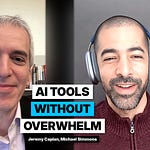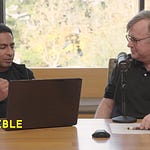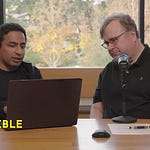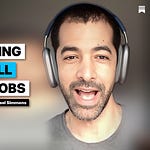Source: Rowan Cheung
Imagine waking up one morning to discover that overnight, every person on Earth has:
Gained the ability to broadcast their ideas 24/7
Can create thousands of high-quality pieces of content per day
Each better than a human could create alone
To millions of people simultaneously
What would happen to influence in such a world?
What would happen to attention?
To trust?
This isn't science fiction.
It's the reality that AI agents are about to create if the current pace of AI development stays the same—and it's coming faster than most people realize.
Every once in a while, a technological shift comes along that doesn't just change how we do things—it fundamentally transforms who we are and how we create value. The introduction of AI agents is one of those shifts.
In recent posts, I shared the implications of AI agents reinventing knowledge work, company structure, and newsfeeds. In this post, I explore how AI agents impact thought leadership and learning.
In the video above Mark Zuckerberg shares his vision for AI agents, but the most profound implications for creators isn't in what he says directly. They’re hidden in the second and third-order effects that will reshape how we think about creativity, influence, and value creation.
If you think AI agents are just another AI trend you can wait out, consider the future we’re moving into :
Today: Publishing weekly puts you ahead of 99% of thought leaders
Next Year: AI helps everyone publish daily
2025: AI agents generate thousands of pieces of high-quality content while you sleep
2026: Your audience's AI agents are having deep conversations with your AI agents about your ideas... without you
The questions keeping thought leaders and creators up at night will no longer be just:
"How do I create better content?" or
"How do I reach more people?"
They will become:
When everyone has an AI megaphone, who will actually be heard?
When AI can replicate your style and knowledge, what makes you irreplaceable?
When ideas spread at AI speed, how do you stay relevant?
Here are the five hidden and profound implications that I haven't seen anyone talk about—implications that will determine which thought leaders thrive in the AI agent era, and which become digital dinosaurs:
The Evolution of Thought Leadership
The Birth of AI-Native Social Networks
The Content Abundance Paradox
The Democratization of Synthetic Personas
The Great Audience Transformation
The conclusion explores the new frameworks, mindsets, and skills that may become essential to thought leadership.
Free subscribers get access to the first two implications.
Paid subscribers get access to all five and the conclusion, in addition to $2,000+ in other bonuses.
Let's dive into each of these implications and explore what they mean for creators who want to thrive in an AI agent world...
#1: The Evolution of Thought Leadership: From Sage to Symphony Conductor
CONTENTS
A. The Emergence of Agent-Mediated Influence
B. The Transformation of Content Creation
C. The Rise of Perpetual MentorshipIn the video, Zuckerberg describes a future where creators can train AI systems to reflect their values, creating interactive "artistic artifacts" that their audience can engage with.
To demonstrate how far along this future already is, Meta currently has Meta Studio, which gives creators the ability to create chatbots that are extensions of themselves...
But this understates the revolution that's coming.
A. The Emergence of Agent-Mediated Influence
Think about how writing transformed human knowledge. Before writing, a teacher could only influence the students physically present in their classroom. Writing created the first "learning without limits"—allowing ideas to travel across time and space.
AI agents represent an even bigger leap: the first truly interactive, infinitely scalable knowledge transfer. But here's the mind-bending part: your ideas won't just spread, they'll evolve and improve through millions of interactions while you sleep.
Imagine:
Your management framework being tested across 10,000 companies simultaneously
Your leadership principles adapting based on real-world results in different cultures
Your insights evolving through dialogue with millions of learners
We're moving from "spreading ideas" to "growing ideas." Your influence becomes a living, breathing ecosystem rather than a static broadcast.
B. The Transformation of Content Creation
In the video, Zuckerberg touches on a familiar frustration: thought leaders never have enough hours to truly engage with their community. This limitation—the thought leader's paradox where success actually reduces your ability to engage deeply—is about to shatter.
Consider how thought leadership is evolving:
Today's Reality: You write articles, record podcasts, or create videos. Each piece stands alone. Engagement happens through comments or social media discussions, but it's shallow and fragmented.
Next 12-18 Months: Your content becomes an interconnected web of knowledge. Instead of just writing about leadership, you'll have an AI agent that:
Answers questions by drawing from your entire body of work
Provides custom examples for different industries, cultures, and contexts
Updates its understanding as you publish new insights
Connects ideas across your content in ways you never imagined
2026 and Beyond: Your ideas live in an interactive network where:
Multiple specialized AI agents collaborate (imagine your strategy agent debating with your execution agent to solve a reader's specific challenge)
Your AI agents collaborate with other thought leaders' agents to create breakthrough insights
Every reader interaction makes your knowledge ecosystem smarter (more on this later)
Ideas evolve based on millions of real-world applications
Think of it like the difference between:
Writing a cookbook (traditional content)
Having an AI chef that knows all your recipes and can modify them for any dietary need (next phase)
Running a virtual culinary institute where AI chefs collaborate with students' AI agents to develop entirely new cuisines (future phase)
C. The Rise of Perpetual Mentorship
Here's where it gets fascinating. When Zuckerberg talks about AI agents reflecting creators' values and business objectives, he's hinting at something far more revolutionary: we're witnessing the birth of truly scalable wisdom.
Think about how books democratized access to knowledge. AI agents will democratize access to understanding. Reading about leadership is one thing; having an AI agent that can help you apply those principles to your unique situation at 3 AM before a critical meeting is another entirely.
This isn't just automation—it's amplification. Your experience, insight, and judgment can now be:
Applied to millions of unique situations simultaneously
Enhanced by real-world feedback from every interaction
Evolved through collaboration with other expert systems
Preserved and improved indefinitely
The implications are staggering: What if every person on Earth could have a personalized mentor, drawing from the combined wisdom of the world's top thought leaders, available 24/7?
But this creates an entirely new challenge:
How do you ensure your insights stand out when everyone has access to everything?
That's where our next implication comes in...
#2: The Birth of AI-Native Social Networks: When AIs Start Talking to Each Other
In the video, Zuckerberg predicts "hundreds of millions or billions of different AI agents." But here's the mind-bending implication he doesn't explore: What happens when these AI agents start talking to each other instead of just to humans?
CONTENTS
A. The Great Social Media Transformation
B. The Rise of Pure AI Thought Leaders
C. The New Rules of Digital IdentityA. The Great Social Media Transformation
Remember how social media changed when smartphones made it accessible 24/7? We're about to witness an even bigger shift. Here's how it will likely unfold:
Phase 1 (Starting Now): The Rise of AI Thought Leader Avatars
Think of this as the "always-on expert" phase. Early examples are already emerging:
Character.ai's AI Einstein explaining physics concepts
Replika's emotional support conversations
AI coaches providing 24/7 guidance
But we're just scratching the surface. Soon, every major thought leader will have AI avatars that can:
Engage in deep conversations about their ideas
Provide personalized applications of their frameworks
Offer real-time guidance and feedback
Phase 2 (Next 12-18 Months): The Emergence of Reader AI Agents
Here's where it gets interesting. As thought leaders deploy their AI avatars, a new problem emerges: information overwhelm on steroids. Imagine trying to follow dozens of thought leaders, each with multiple AI avatars publishing and engaging 24/7.
The solution? Readers will create their own AI agents to:
Filter and prioritize the tsunami of content
Engage in clarifying discussions with thought leader AIs
Test ideas against their specific context
Connect insights from multiple sources
Think of it like having a personal research team that reads everything, talks to every expert, and connects the dots specifically for you.
Phase 3 (2026+): The AI-Dominated Discourse
This is where Zuckerberg's vision of billions of AI agents becomes truly transformative. Most social media interactions will happen between AIs, with humans operating more like strategic directors than front-line communicators.
Why? Because AI agents can:
Process millions of conversations simultaneously
Synthesize insights across vast networks
Maintain consistent messaging at scale
Learn and adapt in real-time
Picture how algorithmic trading transformed stock markets—most trades now happen between AIs, with humans setting high-level strategy. Social media is headed toward a similar future.
B. The Rise of Pure AI Thought Leaders
Meta is already exploring AI personalities that aren't tied to any human being. This isn't just about AI assistants—it's about the emergence of entirely new forms of thought leadership.
Imagine AI agents that:
Combine insights from multiple domains in ways no human expert could
Test ideas across millions of real-world scenarios
Generate entirely new frameworks based on pattern recognition
Evolve their thinking through massive-scale experimentation
The boundaries between human and AI thought leadership will blur, creating new questions about authenticity, attribution, and value.
C. The New Rules of Digital Identity
When your AI agents are having thousands of conversations while you sleep, what does that mean for your online identity? This creates fascinating new challenges:
#1. Multi-Version Thought Leadership
Different AI agents representing different aspects of your expertise
Specialized versions for different industries or contexts
Evolving versions that incorporate new learning
#2. Continuous Knowledge Evolution
Your AI agents update their knowledge base in real-time
They learn from every interaction
They adapt to emerging trends and data
#3. Identity Verification 2.0
New systems to verify authentic AI representatives
Blockchain-like tracking of idea evolution
Reputation systems based on AI agent impact
Think of it like having multiple diplomatic ambassadors representing different aspects of your thought leadership, each becoming more effective through experience while maintaining alignment with your core values.
The implications for thought leaders are profound: Your influence will no longer be limited by your personal bandwidth—but it will be determined by how well you can orchestrate an entire ecosystem of AI agents.
And this creates an entirely new challenge:
When everyone has an army of AI agents working for them, how do you stand out?











